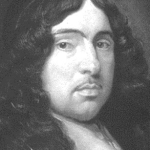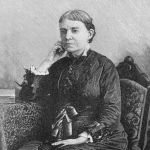TO THE LORD FAIRFAX
See how the archèd earth does here
Rise in a perfect hemisphere!
The stiffest compass could not strike
A line more circular and like;
Nor softest pencil draw a brow
So equal as this hill does bow.
It seems as for a model laid,
And that the world by it was made.
Here learn, ye mountains more unjust,
Which to abrupter greatness thrust,
That do with your hook-shouldered height
The earth deform and heaven fright,
For whose excrescence, ill-designed,
Nature must a new centre find,
Learn here those humble steps to tread,
Which to securer glory lead.
See what a soft access and wide
Lies open to its grassy side;
Nor with the rugged path deters
The feet of breathless travellers.
See then how courteous it ascends,
And all the way it rises bends;
Nor for itself the height does gain,
But only strives to raise the plain.
Yet thus it all the field commands,
And in unenvied greatness stands,
Discerning further than the cliff
Of heaven-daring Tenerife.
How glad the weary seamen haste
When they salute it from the mast!
Directs, and this no less by day.
Upon its crest this mountain grave
A plump of agèd trees does wave.
No hostile hand durst ere invade
With impious steel the sacred shade.
For something always did appear
Of the great Master’s terror there:
And men could hear his armour still
Rattling through all the grove and hill.
Fear of the Master, and respect
Of the great Nymph, did it protect,
Vera the Nymph that him inspired,
To whom he often here retired,
And on these oaks engraved her name;
Such wounds alone these woods became:
But ere he well the barks could part
’Twas writ already in their heart.
For they (’tis credible) have sense,
As we, of love and reverence,
And underneath the coarser rind
The genius of the house do bind.
Hence they successes seem to know,
And in their Lord’s advancement grow;
But in no memory were seen,
As under this, so straight and green;
Yet now no further strive to shoot,
Contented if they fix their root.
Nor to the wind’s uncertain gust,
Their prudent heads too far intrust.
Only sometimes a fluttering breeze
Discourses with the breathing trees,
Which in their modest whispers name
Those acts that swelled the cheek of fame.
‘Much other groves’, say they, ‘than these
And other hills him once did please.
Through groves of pikes he thundered then,
And mountains raised of dying men.
For all the civic garlands due
To him, our branches are but few.
Nor are our trunks enow to bear
The trophies of one fertile year.’
’Tis true, ye trees, nor ever spoke
More certain oracles in oak.
But peace, (if you his favour prize):
That courage its own praises flies.
Therefore to your obscurer seats
From his own brightness he retreats:
Nor he the hills without the groves,
Nor height, but with retirement, loves.



















Comment form: